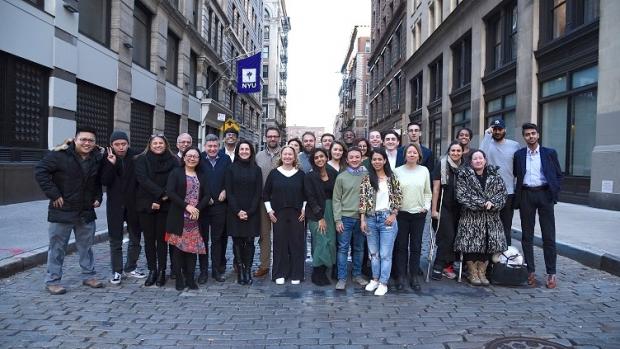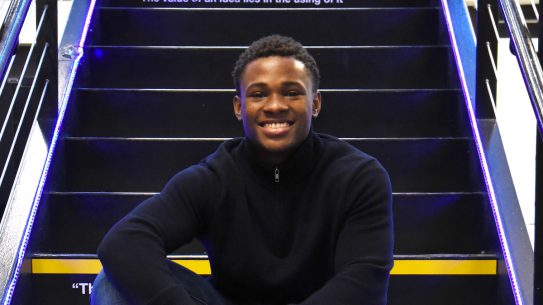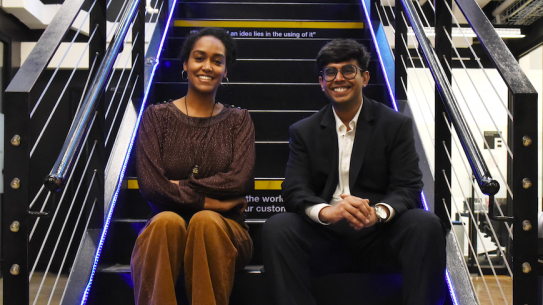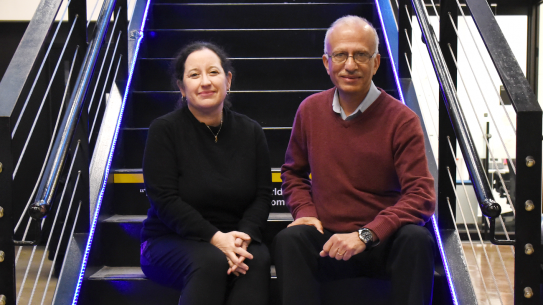The start of the year could be the start of something big
NYU Tandon teams take part in a J-Term program aimed at aspiring entrepreneurs

J-Term 2020 Startup Sprint Participants
J-Term, the period between the fall and spring semesters, finds some students and faculty members traveling or tackling courses that might not fit into their usual academic schedules. This January, a select group used their time to explore the process of launching a business. Participants in the J-Term Startup Sprint, a program overseen by NYU’s Entrepreneurial Institute and Tandon’s Convergence for Innovation and Entrepreneurship (CIE) Institute got an introduction to Lean Startup methodology, learning the importance of interviewing potential customers, articulating a compelling value proposition, identifying a scalable business model, and more.
NYU Tandon was well-represented during the Sprint, which is open to members of the entire university community, and with each team intending to pursue its business ideas further, we might soon be seeing a new platform aimed at helping underrepresented high school students, AI being widely deployed in the chemical manufacturing industry, and steel construction made much easier.
Idealists with a practical idea
Kori Vernon (Tandon ‘22) and Carlin Guervil (Gallatin ‘21)
When Carlin Guervil first began navigating the college admissions process, it hit him just how under-resourced some New York City high schools can be. Although enriching extracurricular activities, SAT prep courses, and accurate information about possible scholarships might be readily available to those in wealthier districts, those resources are not a given for lower-income, inner-city students — particularly when their school’s overworked guidance counselors might each be juggling dozens of cases at a time.

His vision: Youth Connect, an online platform that would provide personalized information about outside programs and opportunities and allow counselors to better track the students under their care. To build it, Guervil, who is now studying leadership and management at Gallatin, turned to Tandon computer science major Kori Vernon; the two are now well on their way to creating a viable product with the potential to change lives.
“One of the most valuable elements of the Startup Sprint for me was learning about customer discovery,” Vernon says. “My tendency had been to dive right into coding things that I myself wanted to build, but I realize now how important it is to always keep the end user and their needs in mind.
Financial inclusion
Asnat Ghebremedhin and Akash Yadav (both Tandon’s Center for Urban Science and Progress ‘20)
When Asnat Ghebremedhin was asked to write about an emerging trend in a Civic Analytics & Urban Intelligence course, she began thinking about the current boom of mobile banking in Kenya and how it was encouraging financial inclusion and female empowerment in that country. With experience working with the United Nations High Commissioner for Refugees, she knew all too well the problems people in emerging economies faced in their financial lives: they often lacked a credit history, lived far from any bricks-and-mortar bank, or were simply missing the identification documents most institutions require of their customers.

Fellow student Akash Yadav, who had worked with the World Bank in the past, was also interested in issues of financial inclusion and the problems of the unbanked, and the two joined forces to participate in the Startup Sprint. Their brainchild, Guava, is a customizable “Know-Your-Customer” verification tool for consumer lending companies in developing countries to decrease the risk of granting loans to under-documented people.
They credit the team at the Leslie eLab with helping them hone in on the right customer segments and craft a value proposition and are looking forward to developing Guava further.
If you’re wondering about the reasoning behind that name, they explain, “Guavas grow in the regions we are targeting; they’re green on the outside, which is representative of money; and really, we just found it fun and catchy.”
Faculty member and founder
Debra Laefer (Professor of Civil and Urban Engineering) and Salam Al-Sabah (her former post-doctoral researcher)
For more than a century, construction professionals have used the same techniques to join structural steel elements. Now, Professor of Civil and Urban Engineering Debra Laefer, who is also affiliated with NYU’s Center for Urban Science and Progress (CUSP), has co-developed with collaborators at the University College Dublin a revolutionary snap-together steel connector that can be used for beams, columns, and portal frames.

“Because of modern laser, water jet, and plasma cutting technologies, together with robotic arms, we’re able to create precise geometries that snap together, eliminating the need for welding and bolting out in the field,” she explains. “Those advanced manufacturing capabilities are making it easier to work with steel, and this can be a real boon to anyone needing to erect and take down structures quickly and affordably, like disaster-relief agencies or the military.”
Intermeshed Steel Connection, as Laefer and her co-founder call their enterprise, will also allow for increased sustainability, since recycling steel now takes many laborious and costly steps, starting with dismantling the bolted and welded connections.
With modern construction as complex as it is — involving architects, contractors, owners, and others, all with their own competing priorities — Laefer found the process of customer discovery eye-opening. “I’ve had lots of experience in doing construction-related research but little idea of how to enter the market, given that the path is relatively ad-hoc and unclear,” she says. “What I learned during the Startup Sprint is going to inform how I assess the commercial potential of all my research in the future.”




